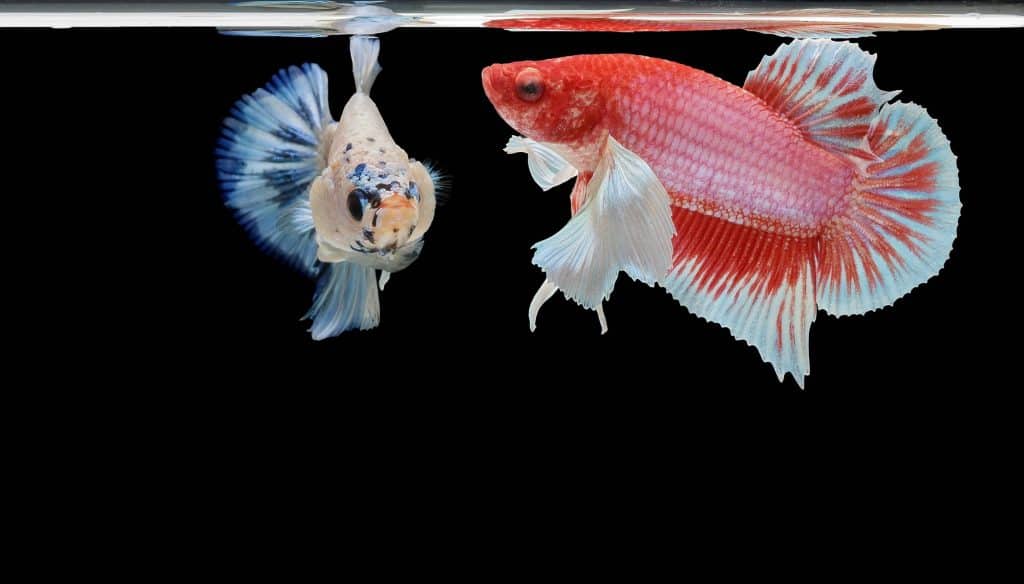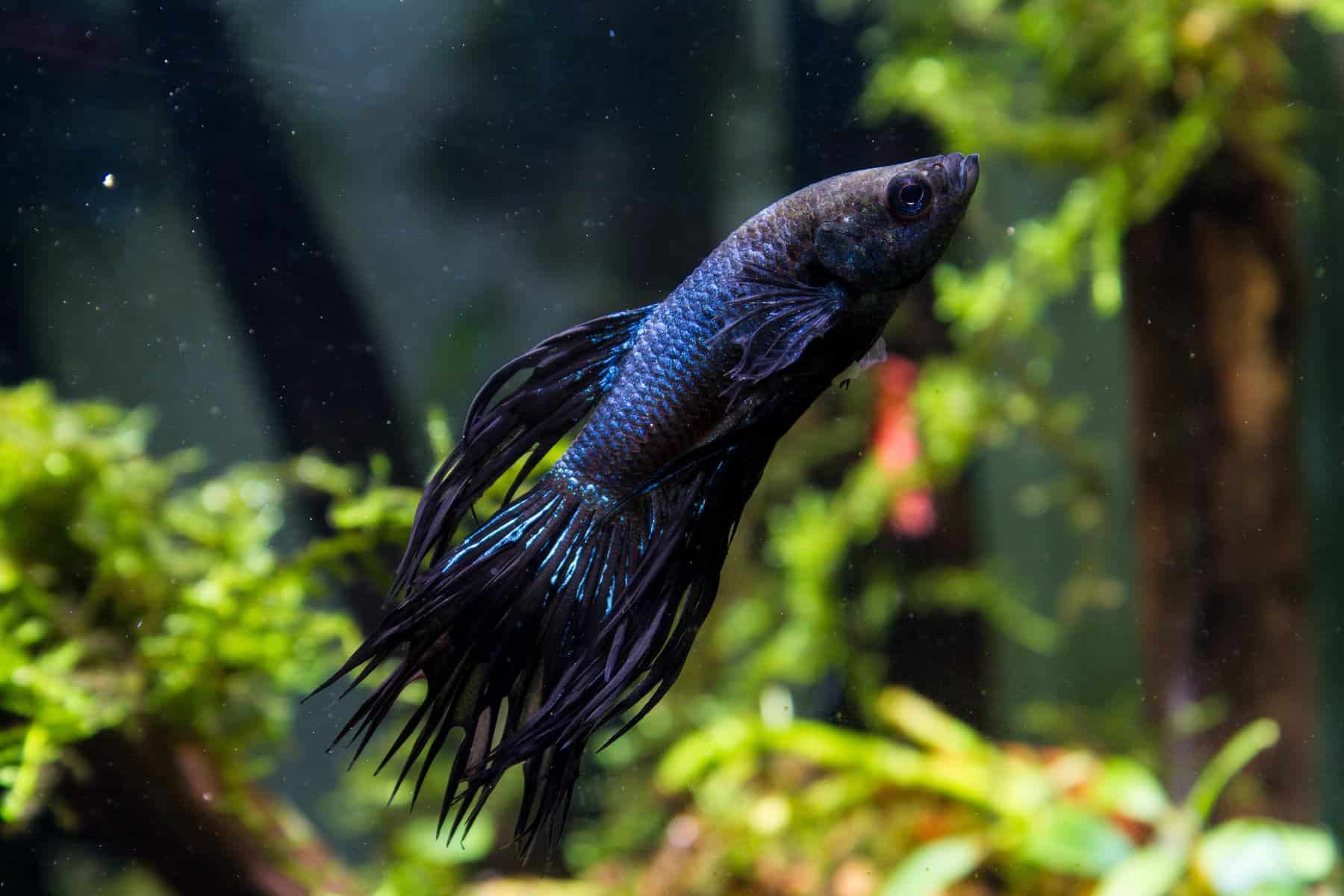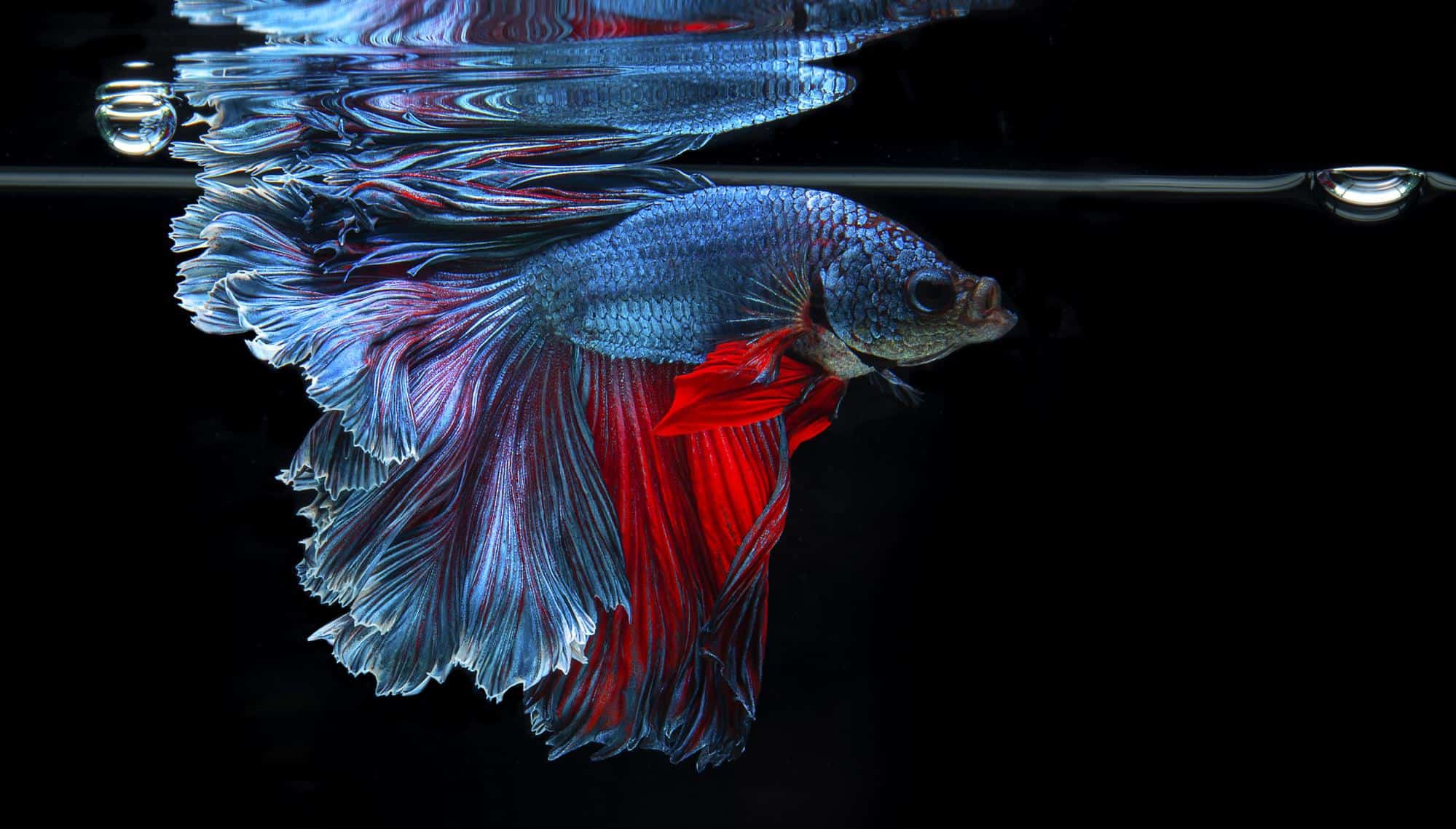If you’re a first-time betta owner, you might wonder if your pet sleeps when the lights go out at night.
The short answer is yes, betta fish do sleep.
But how do they do it without sinking to the bottom of the tank? And does your betta need to keep swimming to breathe? We answer those questions and more below; read on to find out more!
How do fish sleep?
Many fish can reduce their activity and slow their metabolisms to conserve energy, yet remain alert to potential threats. Some fish burrow into the substrate to rest. Others wriggle into rock crevices, while some build a nest in which to nap. And a few fish, like sharks, for example, “sleep” while they continue swimming.
According to scientific studies, these periods of resting, or suspended animation, enable the fish to recover from the day’s activities, just like sleep does for people, animals, and birds.
So what does that mean for your betta buddy? It doesn’t sleep in the same way you do, although your pet does spend quite a lot of its time resting — you may notice your beautiful fish lying on a flat leaf or disappearing into its floating log during the daytime; that’s the fishy equivalent of taking a nap!
When do betta fish sleep?
Your betta’s body clock is similar to yours in the sense that it reacts to the usual cycle of daylight and darkness.
Your fish will be up and moving around to look for food when the sun comes up in the morning. When the sun sets and darkness falls, your betta settles down to sleep for the night. And throughout the day, between feeding and patrolling its territory, your pet takes many naps.
Can bettas sleep with the light on?
No, bettas can’t sleep if tank lights are left on overnight. Most fish species do not have eyelids, so they cannot close their eyes when they go to sleep. (The freshwater pufferfish, however, is an exception.)
If you think about it, fish don’t really need eyelids. The purpose of the eyelid in mammals is to keep the eye moist and protected from foreign objects, dust, and damage.
Your betta spends all its time underwater, so it doesn’t need eyelids to keep its eyes wet; land mammals, on the other hand, have evolved to have eyelids because most of them don’t spend much time immersed in water.
That’s why you should limit the number of hours the aquarium lights are switched on and the tank is unlit at night. That way, your fishy friend will always know when it’s time to be active and feed or rest and recuperate. If you keep the tank lights on for too long, your fish won’t rest and might get stressed.
How to know if your betta is sleeping
Bettas sleep in different positions and locations, so it can be difficult to tell if your fish is asleep. If your betta is resting completely motionless on a leaf, look closely at its mouth and gills to see that they’re moving. If they are, it’s probably asleep.
Some owners report that their betta’s coloration is not so bright when it sleeps. That might be true since bettas do change color when displaying aggression or during spawning.
Provided your betta is still eating and active between naps, then you have nothing to be concerned about. That’s just how a healthy, happy betta fish behaves.
Betta fish sleeping position
Usually, betta fish sleep resting upright on their bellies. However, every individual fish has a sleeping preference just like you do!
It’s not unusual for some bettas to sleep on their sides, typically when they have a comfortable nest of dense plant leaves or a betta hammock to rest on.
- A naturalistic leaf hammock for your betta to rest on
- Allows your betta to rest near the surface of the water like they do in nature
- Attaches easily with suction cup (included)
If you notice your betta spending a lot of time lying on one side, it could be an indication that potential health problems are brewing. Check the water parameters and temperature to make sure your fish isn’t suffering from ammonia poisoning or temperature shock.
While some bettas sleep on their sides, others wedge themselves between an internal filter box and the side of the tank or sleep vertically. Provided that the behavior is normal for your fish and it repeats it regularly, the sleeping position it chooses is fine.
Where do betta fish sleep?
Bettas spend most of their time in the upper area of the tank, feeding at the surface and occasionally breathing via their labyrinth organ. So, what’s going on if your betta’s lying on the bottom of the aquarium?
Don’t panic! Betta fish often nap on a particularly comfortable patch of the substrate, especially if you’ve used soft sand. However, there are a few things to check if you see your betta sleeping on the tank floor.
Bettas do not tolerate strong water movement. If your filter current is too strong, your fish may be getting buffeted around the tank, so it’s sinking to the bottom to get away from the flow.
Bettas are also highly sensitive to temperature shock. If your tank has hot and cool spots, your pet may try to relocate to an area where the temperature is more to its liking.
Make sure your heater is positioned next to the filter outlet so warm water is circulated evenly around the aquarium. You can also put your thermometer as far away from the heater as possible so you can check that the temperature is the same throughout the tank.
Do betta fish need something to sleep on?
You don’t necessarily need to give your fish something to sleep on. Most will sleep on the substrate or among dense plants. Some bettas even float motionless as they sleep.
Do betta fish use leaves as beds?
You may notice your betta fish napping on a flat leaf. That’s normal behavior, and bettas regularly use broad-leaved plants as a hammock to support them as they doze.
Plants like anubias are great additions to a betta tank. If you don’t want to keep living plants in your aquarium, however, you might want to try silk ones instead. You could even include a betta leaf hammock; these imitation plants come with a suction cup so you can fix the hammock to the side of the tank close to the water surface.
How long do bettas sleep?
It’s difficult to tell how long bettas stay asleep, especially as you’re asleep at night time, too. But even if your fish is active during the nights, it’ll catch up on any sleep it misses by napping during the day.
That’s normal for bettas. However, if you notice your fish is very active during the day and uninterested in food, there could be a health problem forming you need to pay attention to.
What does it mean if your betta fish sleeps too much?
Betta fish are generally pretty active social fish. You’ll observe your betta interacting with its tank mates, following you along the glass when you walk by the tank and coming to the water surface when it’s feeding time.
If your betta buddy spends much of the daytime asleep and appears disinterested in its surroundings, you’ll need to make sure there’s not a problem. Several things could make your fish sleep too much:
Temperature shock
As mentioned earlier, bettas are highly sensitive to changes in water temperature. If the tank temperature is too cold, your betta might go into temperature shock. Cold water will cause your pet’s metabolism to slow down so much that it’s a lot less active than it should be.
Bettas are tropical fish, and they need a temperature of between 75 and 81 degrees Fahrenheit. If the temperature falls below 72 degrees, the betta will be too cold.
Warm the water slowly, gradually raising the temperature over an hour or two; if you heat the water too quickly, you could make your fish worse. As the betta gets warmer, you’ll see him waking up and becoming more active.
The ideal temperature for a betta is 78 degrees Fahrenheit, so you’ll need a heater for your fish tank and a thermometer so you can monitor the temperature. Check it every day when you feed your fish and make any adjustments as necessary.
Subdued lighting
Bettas and other fish species figure out when it’s time to sleep based on how bright their habitat is. If you leave your lights off too long, or you have very dim aquarium lighting, your betta might assume it’s still nighttime and will sleep more than it should.
Bored betta
Bettas are highly intelligent, curious fish that need lots of physical and mental stimulation to be kept happy. A bored betta will sleep more than one that’s happy and interested in its surroundings.
- Make your Betta Happy. Helps relieve boredom from captivity.
- Comes complete with top feeding hole
- For use in a minimum 2 gallon Betta enclosure
You can make your betta’s life more interesting by adding lots of plants, decorations, caves, and floating logs to your pet’s tank. You might also want to set aside some time each day to take part in fish training sessions with your betta to teach your pet some cool tricks.
- Includes a 45 minute detailed instructional DVD featuring world famous fish trainer Dr Dean Pomerleau
- Includes a Full Color manual with over 100 photos and packed with training tips
- The easy to use, targeted feeding wand comes with each kit making it easy to reward your fish at the correct times
Mirrors
Some betta owners like to use mirrors to encourage their betta to flare. When the fish sees its reflection in a mirror or the tank glass, it thinks it’s a rival fish in its territory, stimulating the betta to attack the reflection it sees.
That display is undoubtedly impressive and can provide some excellent photo opportunities, and a little flaring is good for your fish. However, if you encourage too much flaring, you risk stressing your pet and causing health problems.
Tank mates
Although male bettas won’t tolerate another male in their tanks, you can provide a few peaceful companions for your betta to keep him from feeling lonely.
When selecting tank mates for your betta, we advise that you choose fish species that are small, peaceful, and prefer to inhabit the midwater or bottom areas of the tank. Avoid fish that are known to be fin nippers; you don’t want them to attack your betta’s flowing tail!
The corydoras catfish is a perfect tank mate for a lonely betta, and there are lots of varieties to consider. Shrimp and snails are also fine for a betta tank, as these creatures spend their time grazing on algae and feeding on leftover fish food and general detritus, which helps keep the environment tidy while providing companionship for your betta.
Sickness
If your betta starts sleeping a lot and the tank’s water parameters are fine, the fish is likely sick.
If your fish has cottony white growths, white spots, lumps, red patches, or torn fins, it could also have a bacterial infection.
Bettas can also be susceptible to bloat and constipation if their diet is incorrect or if you overfeed them. A betta with digestive problems will struggle to swim properly and may spend lots of time lying on the substrate. Starve your betta for 24 to 48 hours, then feed it a very small portion of frozen bloodworms. That should solve the problem.
Age
Bettas usually live for up to four years, but that time can be less. Just like senior people, older bettas tend to sleep or nap more. That’s perfectly normal and is to be expected. Don’t hassle your senior betta buddy; just let it take all the rest it needs!
Laziness
Some bettas are just very lazy! Just like people, bettas can become obese if they don’t get enough exercise, and that can shorten your pet’s life expectancy quite considerably.
Sometimes, it helps to encourage your fish to take part in some training activities or provide it with stimulation in the form of toys and tank mates.
What does it mean if your betta fish doesn’t sleep?
It’s hard to tell just how much your betta is sleeping because you can’t watch him 24/7. Some bettas are more active than others, spending lots of time cruising their territory, exploring, and socializing with their tank mates.
That’s quite normal, especially for young bettas and those who have a few female companions to keep them on their toes. However, you must remember to turn out your betta’s aquarium light at night so it gets plenty of time to sleep undisturbed.
Wrapping Up
It’s very important as a responsible betta owner that you understand your pet’s sleeping patterns so you know how to spot any problems before the betta’s health is affected.
Your betta needs to rest and sleep as you do. Some like to sleep on a comfy bed, so provide the fish with many a bushy aquarium plant and a betta hammock. Make sure you don’t leave the tank lights on overnight or for too many hours during the day so your betta can get plenty of snooze time.















